#Intellectual Property Rights Lawyer
Explore tagged Tumblr posts
Text
I Want The Best Intellectual Property Lawyer Near Me
Because intellectual property law is still developing, there are still many unopened boxes, this area of law has had significant advances, but it also confronts multiple challenges that must be addressed in order to eliminate barriers to its development.
When it comes to dealing with these sorts of problems, the work of an intellectual property lawyer is extensive and multifaceted, thus an ip lawyer must be competent and recognized for possessing certain fundamental abilities that can assist them flourish in this new area of law.
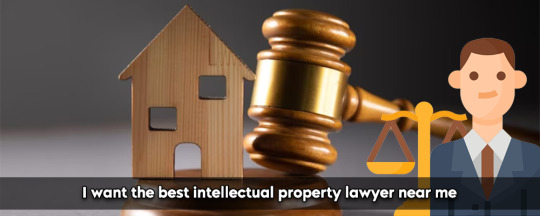
Fundamental Skills to Find: Intellectual Property Lawyers
Skills to Deal with Oppositions:
There have been a lot more challenges and opposition since pre-registration. Therefore, legal advice is an all-time requirement for many filing trademark applications.
The amount of work is increasing considerably more quickly than lawyers as well as law firms can now handle. As a result, both the charges and the margins are relatively substantial.
Being efficient with trademark registration, especially for handling oppositions and dealing with them, is a surefire way to secure an excellent position as an IP lawyer.
Skills for Conducting Due Diligence
Due diligence in this particular domain is specialized. Many significant companies that are for auction, have sought to list, or are even searching for substantial amounts of financing require the service for due diligence in IP.
The buyer, investor, or financier usually becomes the one who benefits from the services being provided. Therefore, various law firms are frequently used to carry out IP due diligence.
Skills to Calculate the Damages Incurred
Calculating damages in cases of intellectual property infringement is one of the most challenging responsibilities.
In the majority of instances, if someone's violates your intellectual property, you are entitled to all of your damages in addition to whatever financial losses you may have endured as a consequence of the infringement.
The need for lawyers who can use financial frameworks to estimate or measure such damages and then prove them in court is always high.
Skills to Register Trademarks that are non-conventional
Usually, any traditional word or image marks the most valuable trademarks.
For example, there has been an effort to register Mother Teresa's Missionaries of Charity nuns' blue-bordered sarees. Sandesh's textures, etc. are all excellent examples of such trademarks.
The unusual accomplishment of registering such trademarks can make or break your professional record if you have the expertise and experience involved.
Skills to Draft a Franchising Deal
Franchise deals are becoming more and more prevalent. You probably notice a lot of franchised businesses these days.
McDonald's, Kidzee, Apple stores, and Cafe Coffee Day are just a few examples that are well-known. These franchisee agreements are very complicated, and the paperwork must be in excessive detail.
As an ipr lawyer if you work for the franchisor, you may easily bill lakhs for creating and providing advice on a franchisee contract.
Skills to Draft an Application for a Patent
Although only a registered patent agent is allowed to file a patent application, lawyers have developed an ingenious workaround. They managed to have the inventor self-file the application.
However, regardless of whether or not you meet the requirements for a patent attorney, if you know how to create patent claims, how to plan to guarantee that the application gets approved, or if you can secure provisional patents for applicants, these abilities are uncommon and in high demand.
If you are an ip attorney, you must undoubtedly make it a point to acquire these abilities.
How to Find the Most Desirable intellectual property rights lawyer?
There are some established ways to find such a desired lawyer for your specific need. They are:
Obtain recommendations from friends, colleagues, or close relatives who have in the past employed an IP attorney.
To get a suggestion for an intellectual property lawyer, you get in touch with your jurisdictions or local bar association to get an exhaustive list of top IP lawyers in your area.
To find a lawyer with expertise in intellectual property that will satisfy your demands, you can make use of online legal services like Lead India to connect with the top ipr attorney in India.
To preserve and defend your IP rights in every area and against rising market competition, you should hire a qualified intellectual property lawyer.
One can talk to a lawyer from Lead India for any kind of legal support. In India, free legal advice online can be obtained at Lead India. Along with receiving free legal advice online, one can also ask a legal question to the experts online free through Lead India.
SOURCE:-
Visit us: https://www.leadindia.law
Call Us: +91–8800788535
Email: [email protected]
YouTube: https://www.youtube.com/c/LeadIndiaLawAssociates
Facebook: https://www.facebook.com/leadindialaw
LinkedIn: https://www.linkedin.com/company/76353439
Twitter: https://twitter.com/leadindialaw
Pinterest: https://in.pinterest.com/lawleadindia
Instagram:https://www.instagram.com/leadindialawofficial
intellectual property lawyer,ip lawyer,intellectual property rights lawyer,ip attorney,ipr lawyer,ipr attorney,intellectual property attorney.
#intellectual property lawyer#ip lawyer#intellectual property rights lawyer#ip attorney#ipr lawyer#ipr attorney#intellectual property attorney.
0 notes
Text
Are you a business owner or creative professional looking to protect your intellectual property in India? Understanding intellectual property rights and their types is crucial for safeguarding your ideas and creations. Themis and Dike team of experts can provide you with the guidance you need to navigate the complex landscape of intellectual property law in India. Contact us today to learn more about the different types of intellectual property rights and how we can help you protect your ideas and creations.
0 notes
Text
How Can IPR Holder Protect Intellectual Property Rights in Vietnam?
An intellectual property right holder shall have the right to apply the following measures to protect the intellectual property rights in Vietnam of such holder:

Protect Intellectual Property Rights in Vietnam
To apply technological measures to prevent acts of infringement of its intellectual property rights;
To request any organization or individual who commits an act of infringement of the intellectual property rights of the holder to terminate such act, make a public apology or rectification, and pay damages;
To request the competent State body to deal with acts of infringement of its intellectual property rights in accordance with the provisions of this Law and other relevant laws;
To initiate a lawsuit at a court or a claim at an arbitration centre to protect the legitimate rights and interests of the holder.
Organizations and individuals who suffer loss and damage caused by acts of infringement of intellectual property rights or who discover acts of infringement of intellectual property rights which cause loss and damage to consumers or society shall have the right to request the competent State body to deal with such acts in accordance with the provisions of this Law and other relevant laws.
Organizations and individuals who suffer loss and damage or who are likely to suffer loss and damage caused by acts of unfair competition shall have the right to request the competent State body to apply the civil remedies stipulated of IP Law and the administrative remedies stipulated in the law on competition.
Our Intellectual Property Lawyers in Vietnam always follow development in IP Laws to provide client with update.
2 notes
·
View notes
Text
#Top corporate law firm in mumbai#Best law firm in mumbai#best corporate lawyers in mumbai#top legal services in mumbai#best corporate law firm in mumbai#intellectual property rights lawyer mumbai#best law firms for dispute resolution mumbai#best lawyer for real estate mumbai#top real estate lawyers mumbai#https://www.kslegal.co.in/real-estate-infrastructure/
1 note
·
View note
Text
Journey through our essential guide to hiring an Intellectual Property lawyer, a crucial step in protecting your innovative ideas and creations.
#Legal Intellectual Property#Intellectual Property Law Specialist#IP Rights Lawyer#Intellectual Property Lawyer
0 notes
Text
I got this comment on a story from my Other AO3 Account this morning.
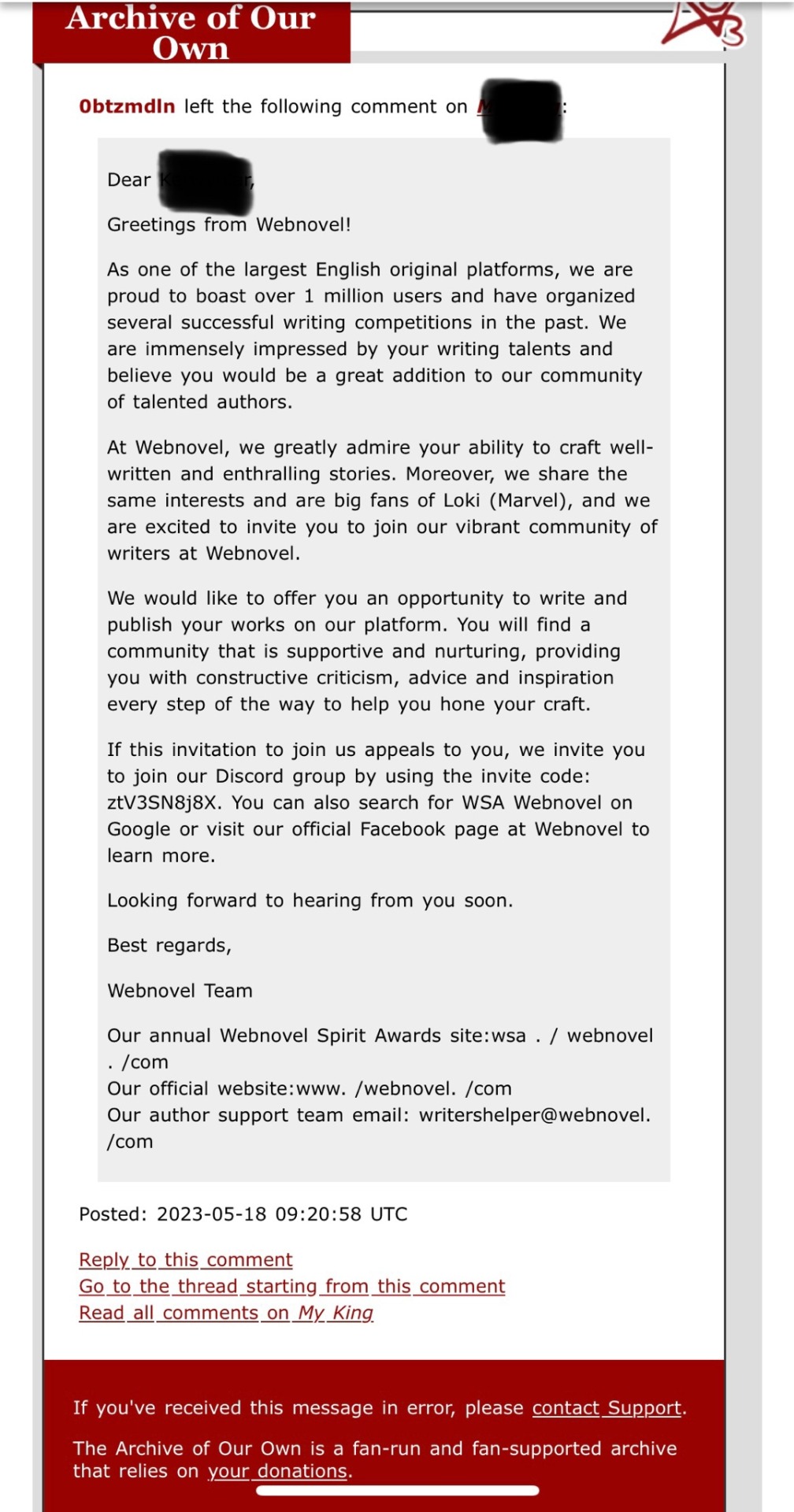
(Info redacted because I prefer keeping these accounts separate but no one follows me on the side blog I have for that account.)
The story was posted almost a year ago and is relatively “popular” by my average statistics even though it has tropes and themes that are big turnoffs for a lot of people (hence separate accounts). This popularity is undoubtedly because it’s a Marvel Loki story and that fandom is massive.
So there is obviously an algorithm or a bot scrubbing ao3 statistics and leaving this comment on fics that meet a certain metric with the main character of the fic inserted into the comment.
I had a little time to kill this morning so I decided to investigate further. And y’all this is so predatory. Come on this journey with me. It made me mad. It may make you mad.
First, if you go to Webnovel’s website, you HAVE to choose between male lead or female lead stories before you can go any further. WTF?
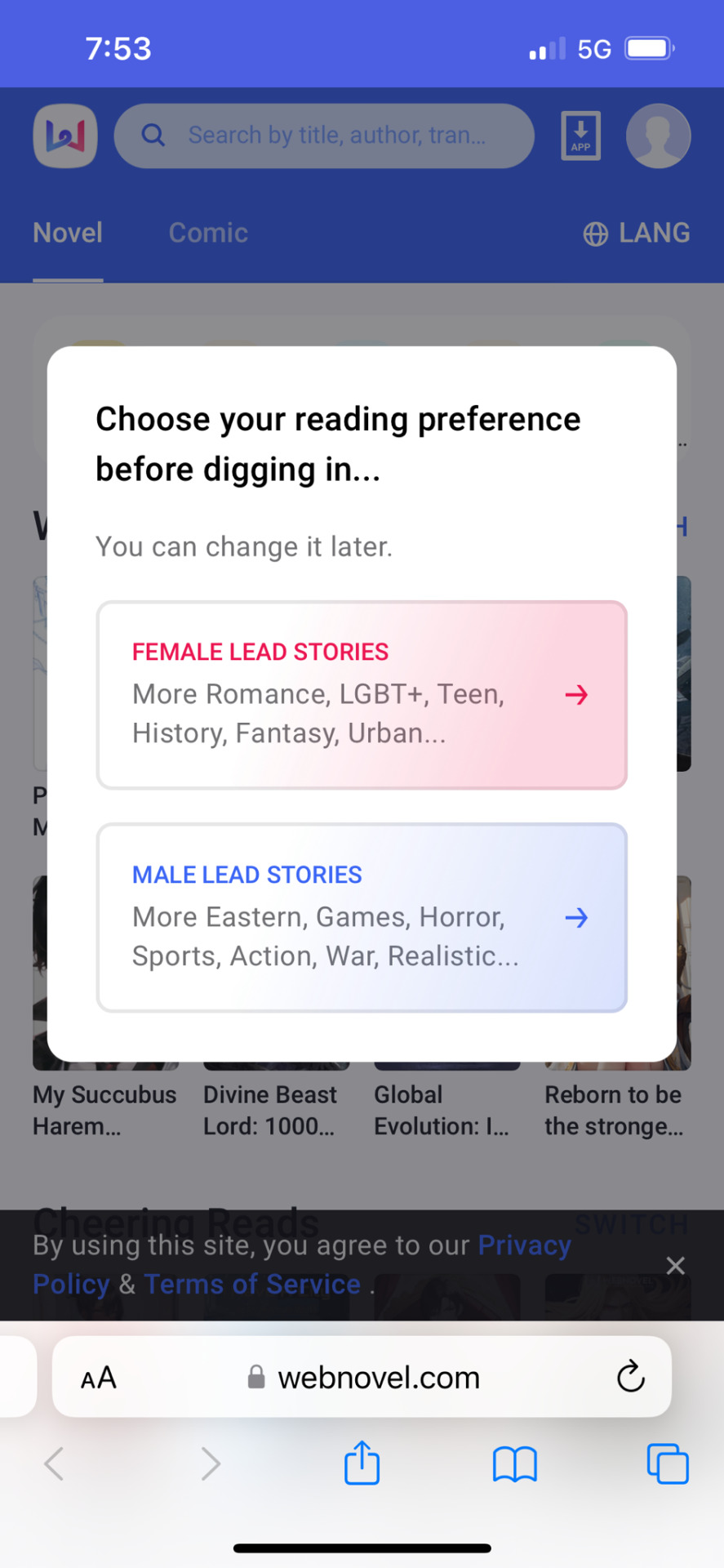
And that’s weird, but this gets so much worse. This is basically a pay-to-read site that has different subscription models. Which… okay BUT! The authors don’t get paid! Look at that comment again. They’re promising a supportive and nurturing community, but zero monetary compensation. It’s basically, “post your stuff here so we can get paid and you can get… nice vibes?” I mean look at this Orwellian writing:
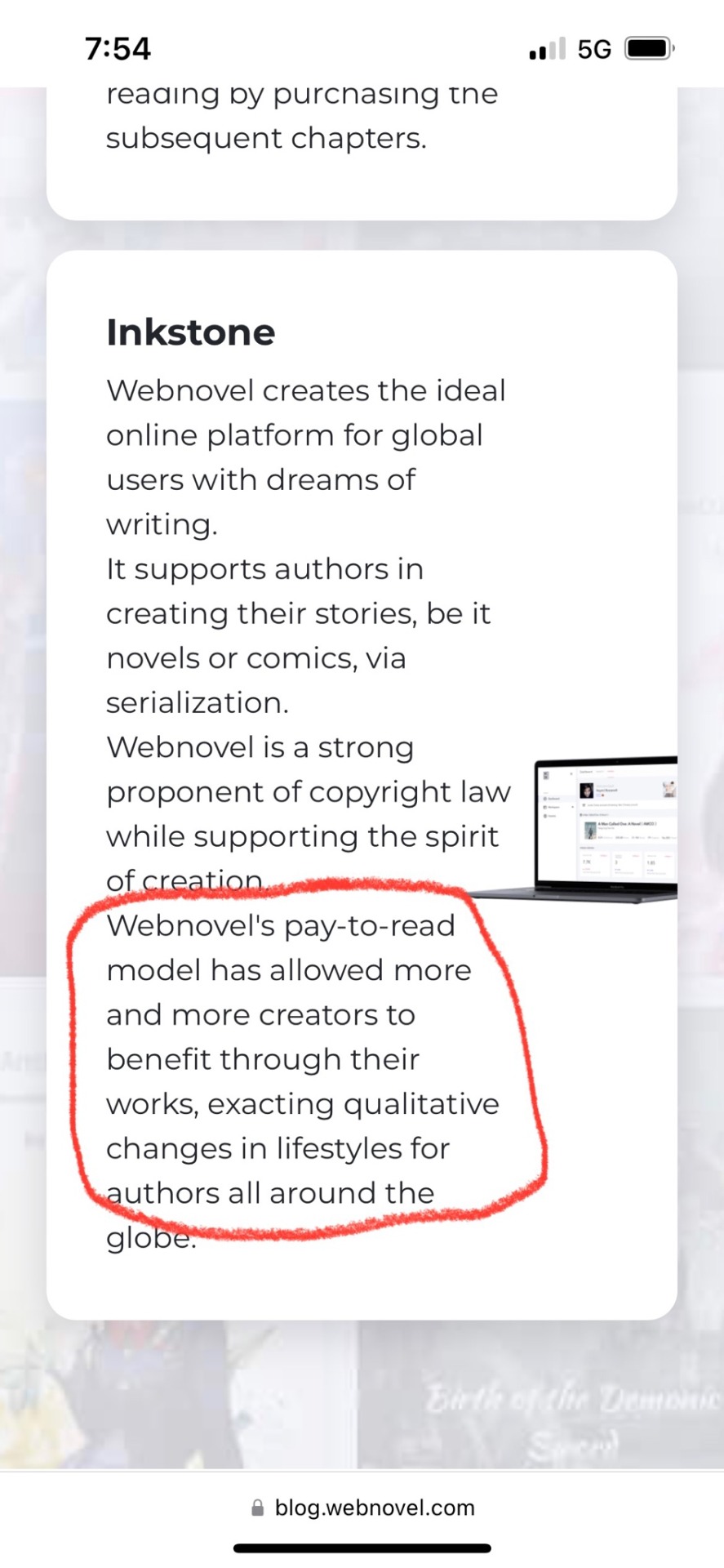
Using the phrase “pay-to-read model” in the same sentence as “qualitative changes in lifestyles for authors” deliberately makes you think that you can get paid and maybe even make a living on this website. But that’s not actually what it says and authors will not receive one red cent.
Oh but wait, the worst is still to come. In case this breaks containment (which I kind of hope it does) this is where I mention that I’m a lawyer in the US.
I don’t do intellectual property or copyright law but I do read and write contracts for a living. So I went to look at their terms of service. It was fun!
Highlights the first, in which Webnovel gets a license to do basically whatever they want with content you post on their site. This is how they get to be paid for people reading authors’ writing without paying them anything.
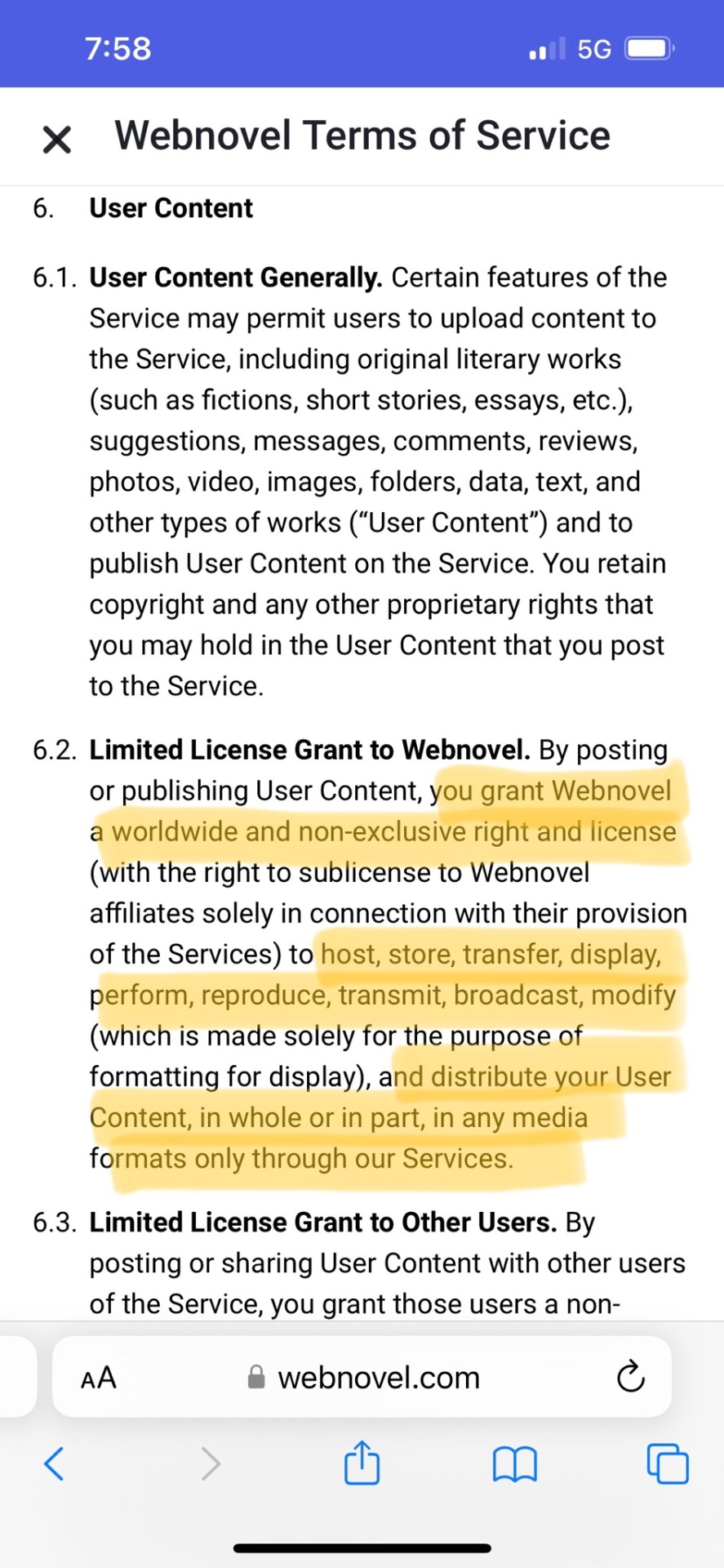
Highlights the second, in which Webnovel takes no responsibility for illegally profiting off of fan fic. This all says that the writer is 100% responsible for everything the writer posts (even though only Webnovel is making money from it).
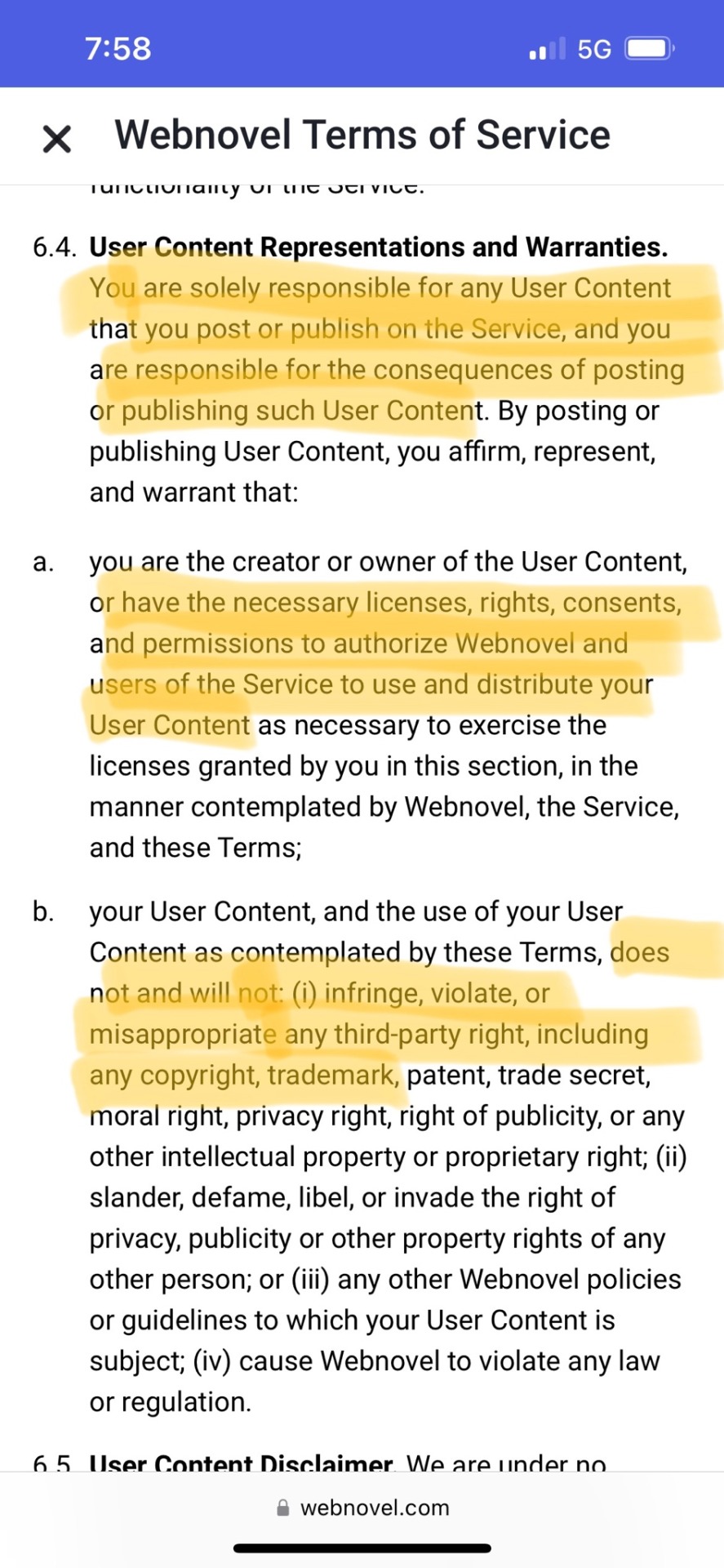
Highlights the third which say that by posting, the author is representing that they have the legal right to use and to let Webnovel use the content according to these terms. So if a writer posts fan fiction and Webnovel makes money from people reading the fan fiction, and the House of the Mouse catches wise, these sections say that that’s ALL on the writer.
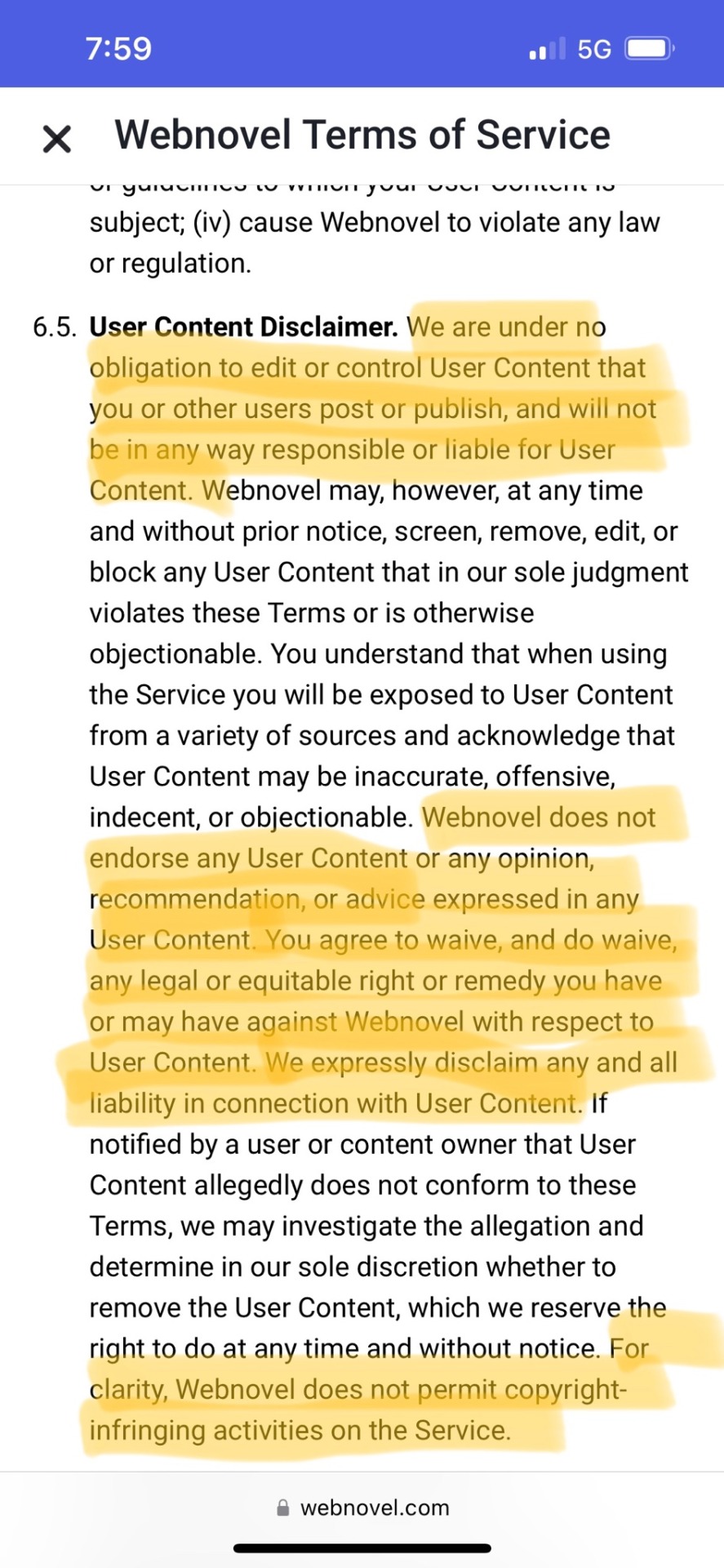
So that’s a little skeevy to start off with but the thing that is seriously shitty and made me make this post was that these assholes are coming to ao3. They are actively recruiting people in comments on their fan fiction. And they are saying they are big fans of the character you’re writing about and that they share your interests.

They are recruiting fan fiction writers and giving every impression that you can make money from posting fan fiction on their site and hiding the fact that you absolutely cannot but they can make money off of you while you try, deep in their terms of service which no one but a lawyer who writes fan fic and has some time to kill will read.
I see posts on here regularly from people who don’t understand how this stuff works, don’t understand that they (and others) can not legally make a financial profit from fan fiction. And there are tons of people who will not take the time to dig into the details.
Don’t deal with these bastards. Fuck Webnovel.
#went down a rabbit hole#got mad#webnovel#this is a scam#how to ao3#fan fiction#please spread the word#long post#50k
52K notes
·
View notes
Text
Trademark Registration In Lucknow
Navigate trademark registration in Lucknow effortlessly with our performance-focused approach. Trust us to secure your brand identity with efficiency and expertise.
#trademark registration for startups lucknow#trademark filing for ecommerce business lucknow#food brand trademark registration lucknow#trademark registration for app in lucknow#international trademark registration lucknow#trademark opposition and cancellation lucknow#government trademark registration fees lucknow#trademark infringement dispute resolution lucknow#trademark renewal services lucknow#register trademark lucknow#trademark filing services lucknow#online trademark registration lucknow#cost of trademark registration in lucknow#trademark lawyer lucknow#trademark consultant lucknow#protect brand name lucknow#intellectual property rights lucknow#copyright registration lucknow#how to file a trademark in lucknow
0 notes
Text
Intellectual Property²!
Be alert and think of how you see your future! 😉 Only one you can trust the most! Everyone who has an account with any social media/network is in reality an owner of an intellectual property. This intellectual property is published online by XYZ. The carrier can not and should not administer any kind of management, changes, editing, blocking, or any others without the consent of the sole owner of…

View On WordPress
#Bloggers#Dr. Sophie Essay#Friends#Intellectual Property lawyers#Intellectual-Property#Lawyers#Social-Media#Users&039; Rights#Users-of-Social-Media#Writers#Writing
0 notes
Text
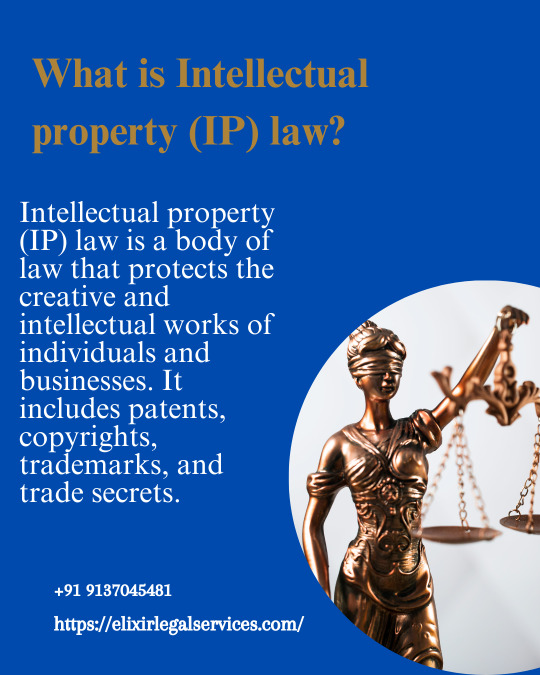
Intellectual property (IP) law is a body of law that protects the creative and intellectual works of individuals and businesses. It includes patents, copyrights, trademarks, and trade secrets.
#Best Intellectual Property Lawyers in Mumbai#intellectual property attorney in mumbai#intellectual property law firm in mumbai#ip lawyer near me in mumbai#best ip law firms in mumbai#property rights attorney in mumbai
0 notes
Text
A Tenant's Suggested Guide: How to Secure Your Deposit Upon Lease Agreement Completion
Completing a lease agreement can be both exciting and daunting for tenants. As you prepare to move on to a new chapter, one crucial aspect is ensuring the return of your security deposit. Understanding the steps involved in recovering your deposit is essential to avoid unnecessary disputes with your landlord. In this article, we’ll outline the key strategies you can employ to secure the return of…

View On WordPress
#Accounting and Law#AIO Legal Services#anti-money laundering compliance#Business law#Cairo University#civil litigation#client representation#commercial law#Contract Law#Debt Recovery#dispute resolution#G Cloud Compliance#GDL#GDPR compliance#intellectual property rights#law consultation#law firm#lawyer#Legal Advice#Legal Consultancy#legal expertise#Legal Professionals.#Legal Representation#Legal Services#Legal Solutions#Legal Support#litigation#LLM#LPC#Nottingham Law School
0 notes
Note
I know copyright and intellectual property is bullshit, but how do I tell that to someone who's convinced that it protects small artists?
tell them about bill mantlo, creator of rocket racoon, whose brother has to start gofundmes to pay his medical bills while marvel makes millions off that character's merch. or to gary friedrich, creator of ghost rider, who sued marvel for using the character at a point where it should have returned to him, lost, and was then counter-sued for selling merch including sketches for fans at conventions. or alan moore, who vowed to never work with DC again after he was screwed out of owning watchmen. or the archetypal examples of this phenomenon, jack kirby (co-creator of iron man, captain america, ant-man, the hulk, and a fuckton more characters) who of course was also screwed out of any ownership, or jerry siegel and joe shuster, who spent decades fighting over the copyright to superman, a character they created and sold for $130 as desperate struggling artists and who then went on to make millions for DC comics.
or if they're not a comics fan, why not talk to them about robert kurvitz, head writer of disco elysium, who through an extremely suspect purchase lost the rights to the world of elysium, representing his life's creative work. or to hideo kojima, who was forced out of konami, keeping absolutely no rights to his iconic metal gear franchise, and had his demo for Silent Hills made into fucking vaporware that nobody can download anymore!
or about the time that disney used threats of legal action to put a stop to such nefarious infringement of their copright as 'being painted on the walls of a daycare' or 'being put on a child's gravestone'.
the thing about copyright is that it has to be enforced in court. a 'small artist' -- even ones who are independently successful and considerably wealthy -- can simply not afford to fight a protracted legal battle while paying top legal talent. disney and marvel and any other big media company, however, can fight as many legal battles as they want for as long and have the legal fees be a drop in the bucket. companies that can afford lawyers and can afford to, if it really comes down to it, lose a lawsuit -- that is, companies with millions of dollars to spare -- are simply above copyright law. this is not a bug--this is a feature. this is the system working as designed.
6K notes
·
View notes
Text
Land and Property Disputes Specialist: Law Offices of India
Best lawyer for Intellectual Property Rights
Are you in need of the best lawyer for Intellectual Property Rights, land and property disputes, or criminal cases? Look no further than the Law Offices of India. With our team of highly professional and experienced attorneys, we provide top-notch legal representation for a wide range of legal matters.
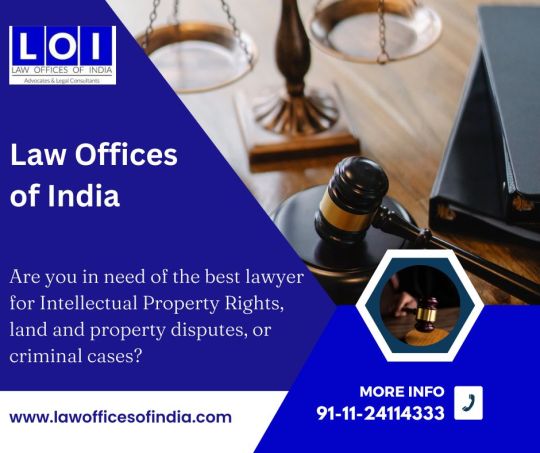
About Intellectual Property Rights
Our lawyers have extensive expertise in protecting your innovations, trademarks, copyrights, and trade secrets. We understand the complexities of IP law and are well-equipped to handle cases involving infringement, licensing, and enforcement.
For land and property disputes
Our dedicated lawyers specialize in resolving ownership conflicts, boundary disputes, and title issues. We work tirelessly to protect your rights and ensure a fair resolution, utilizing our in-depth knowledge of property laws and regulations.
In criminal cases
Our skilled attorneys provide aggressive defense strategies to protect your rights and freedom. With a thorough understanding of criminal law and courtroom procedures, we strive to achieve the best possible outcome for our clients facing charges.
Law Offices of India
We pride ourselves on delivering trustworthy and reliable legal services. We prioritize clear communication, personalized attention, and prompt responsiveness to ensure that our clients receive the highest level of service and support.
Best criminal case lawyer
When you choose Law Offices of India, you can rest assured that you are in capable hands. Contact us today for a consultation with our best criminal case lawyer or to discuss your Intellectual Property Rights or land and property dispute. Trust us to provide you with exceptional legal representation tailored to your specific needs.
For more information regarding Best Lawyer for land and Property Disputes visit the official site.
#Best lawyer for Intellectual Property Rights#Best Lawyer for land and Property Disputes#Best Criminal Case Lawyer#lawyer for Intellectual Property Rights#Lawyer for land and Property Disputes#Criminal Case Lawyer#Land and Property Disputes Specialist#Intellectual Property Rights Expert#Best lawyer#lawyer for Intellectual Property
0 notes
Text
How Can IPR Holder Protect Intellectual Property Rights in Vietnam?
An intellectual property right holder shall have the right to apply the following measures to protect the intellectual property rights in Vietnam of such holder:

Protect Intellectual Property Rights in Vietnam
To apply technological measures to prevent acts of infringement of its intellectual property rights;
To request any organization or individual who commits an act of infringement of the intellectual property rights of the holder to terminate such act, make a public apology or rectification, and pay damages;
To request the competent State body to deal with acts of infringement of its intellectual property rights in accordance with the provisions of this Law and other relevant laws;
To initiate a lawsuit at a court or a claim at an arbitration centre to protect the legitimate rights and interests of the holder.
Organizations and individuals who suffer loss and damage caused by acts of infringement of intellectual property rights or who discover acts of infringement of intellectual property rights which cause loss and damage to consumers or society shall have the right to request the competent State body to deal with such acts in accordance with the provisions of this Law and other relevant laws.
Organizations and individuals who suffer loss and damage or who are likely to suffer loss and damage caused by acts of unfair competition shall have the right to request the competent State body to apply the civil remedies stipulated of IP Law and the administrative remedies stipulated in the law on competition.
Our Intellectual Property Lawyers in Vietnam always follow development in IP Laws to provide client with update.
Source ANTLawyers: https://antlawyers.vn/qa/how-can-ipr-holder-protect-intellectual-property-rights-in-vietnam.html
1 note
·
View note
Text
"yeah I'm a communist"
"wait, the family? you don't want to actually like.. abolish that haha.. right?"
"oh, intellectual property? yeah we need more lawyers to help small artists. these billionaires now have an entire machine just to steal art, it's ridiculous"
"genocide? well both sides are pro genocide so I really have no choice but to support 99% Hitler"
652 notes
·
View notes
Text
Good riddance to the Open Gaming License
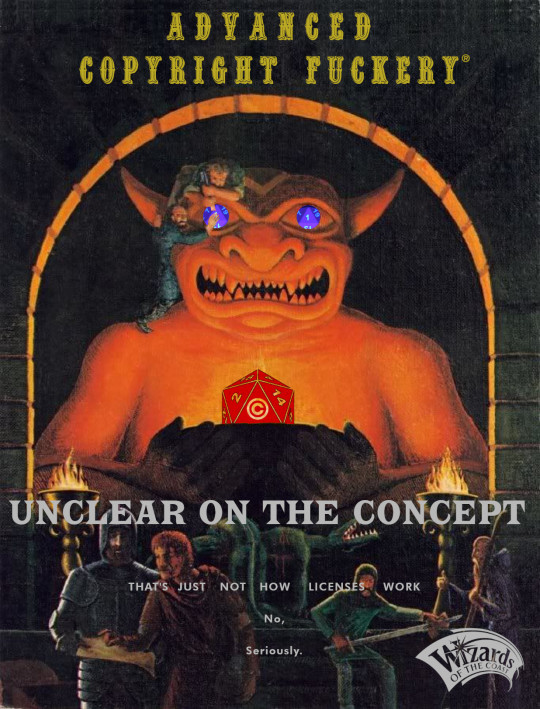
Last week, Gizmodo’s Linda Codega caught a fantastic scoop — a leaked report of Hasbro’s plan to revoke the decades-old Open Gaming License, which subsidiary Wizards Of the Coast promulgated as an allegedly open sandbox for people seeking to extend, remix or improve Dungeons and Dragons:
https://gizmodo.com/dnd-wizards-of-the-coast-ogl-1-1-open-gaming-license-1849950634
The report set off a shitstorm among D&D fans and the broader TTRPG community — not just because it was evidence of yet more enshittification of D&D by a faceless corporate monopolist, but because Hasbro was seemingly poised to take back the commons that RPG players and designers had built over decades, having taken WOTC and the OGL at their word.
Gamers were right to be worried. Giant companies love to rugpull their fans, tempting them into a commons with lofty promises of a system that we will all have a stake in, using the fans for unpaid creative labor, then enclosing the fans’ work and selling it back to them. It’s a tale as old as CDDB and Disgracenote:
https://en.wikipedia.org/wiki/CDDB#History
(Disclosure: I am a long-serving volunteer board-member for MetaBrainz, which maintains MusicBrainz, a free, open, community-managed and transparent alternative to Gracenote, explicitly designed to resist the kind of commons-stealing enclosure that led to the CDDB debacle.)
https://musicbrainz.org/
Free/open licenses were invented specifically to prevent this kind of fuckery. First there was the GPL and its successor software licenses, then Creative Commons and its own successors. One important factor in these licenses: they contain the word “irrevocable.” That means that if you build on licensed content, you don’t have to worry about having the license yanked out from under you later. It’s rugproof.
Now, the OGL does not contain the word “irrevocable.” Rather, the OGL is “perpetual.” To a layperson, these two terms may seem interchangeable, but this is one of those fine lawerly distinctions that trip up normies all the time. In lawyerspeak, a “perpetual” license is one whose revocation doesn’t come automatically after a certain time (unlike, say, a one-year car-lease, which automatically terminates at the end of the year). Unless a license is “irrevocable,” the licensor can terminate it whenever they want to.
This is exactly the kind of thing that trips up people who roll their own licenses, and people who trust those licenses. The OGL predates the Creative Commons licenses, but it neatly illustrates the problem with letting corporate lawyers — rather than public-interest nonprofits — unleash “open” licenses on an unsuspecting, legally unsophisticated audience.
The perpetual/irrevocable switcheroo is the least of the problems with the OGL. As Rob Bodine— an actual lawyer, as well as a dice lawyer — wrote back in 2019, the OGL is a grossly defective instrument that is significantly worse than useless.
https://gsllcblog.com/2019/08/26/part3ogl/
The issue lies with what the OGL actually licenses. Decades of copyright maximalism has convinced millions of people that anything you can imagine is “intellectual property,” and that this is indistinguishable from real property, which means that no one can use it without your permission.
The copyrightpilling of the world sets people up for all kinds of scams, because copyright just doesn’t work like that. This wholly erroneous view of copyright grooms normies to be suckers for every sharp grifter who comes along promising that everything imaginable is property-in-waiting (remember SpiceDAO?):
https://onezero.medium.com/crypto-copyright-bdf24f48bf99
Copyright is a lot more complex than “anything you can imagine is your property and that means no one else can use it.” For starters, copyright draws a fundamental distinction between ideas and expression. Copyright does not apply to ideas — the idea, say, of elves and dwarves and such running around a dungeon, killing monsters. That is emphatically not copyrightable.
Copyright also doesn’t cover abstract systems or methods — like, say, a game whose dice-tables follow well-established mathematical formulae to create a “balanced” system for combat and adventuring. Anyone can make one of these, including by copying, improving or modifying an existing one that someone else made. That’s what ��uncopyrightable” means.
Finally, there are the exceptions and limitations to copyright — things that you are allowed to do with copyrighted work, without first seeking permission from the creator or copyright’s proprietor. The best-known exception is US law is fair use, a complex doctrine that is often incorrectly characterized as turning on “four factors” that determine whether a use is fair or not.
In reality, the four factors are a starting point that courts are allowed and encouraged to consider when determining the fairness of a use, but some of the most consequential fair use cases in Supreme Court history flunk one, several, or even all of the four factors (for example, the Betamax decision that legalized VCRs in 1984, which fails all four).
Beyond fair use, there are other exceptions and limitations, like the di minimis exemption that allows for incidental uses of tiny fragments of copyrighted work without permission, even if those uses are not fair use. Copyright, in other words, is “fact-intensive,” and there are many ways you can legally use a copyrighted work without a license.
Which brings me back to the OGL, and what, specifically, it licenses. The OGL is a license that only grants you permission to use the things that WOTC can’t copyright — “the game mechanic [including] the methods, procedures, processes and routines.” In other words, the OGL gives you permission to use things you don’t need permission to use.
But maybe the OGL grants you permission to use more things, beyond those things you’re allowed to use anyway? Nope. The OGL specifically exempts:
Product and product line names, logos and identifying marks including trade dress; artifacts; creatures characters; stories, storylines, plots, thematic elements, dialogue, incidents, language, artwork, symbols, designs, depictions, likenesses, formats, poses, concepts, themes and graphic, photographic and other visual or audio representations; names and descriptions of characters, spells, enchantments, personalities, teams, personas, likenesses and special abilities; places, locations, environments, creatures, equipment, magical or supernatural abilities or effects, logos, symbols, or graphic designs; and any other trademark or registered trademark…
Now, there are places where the uncopyrightable parts of D&D mingle with the copyrightable parts, and there’s a legal term for this: merger. Merger came up for gamers in 2018, when the provocateur Robert Hovden got the US Copyright Office to certify copyright in a Magic: The Gathering deck:
https://pluralistic.net/2021/08/14/angels-and-demons/#owning-culture
If you want to learn more about merger, you need to study up on Kregos and Eckes, which are beautifully explained in the “Open Intellectual Property Casebook,” a free resource created by Jennifer Jenkins and James Boyle:
https://web.law.duke.edu/cspd/openip/#q01
Jenkins and Boyle explicitly created their open casebook as an answer to another act of enclosure: a greedy textbook publisher cornered the market on IP textbook and charged every law student — and everyone curious about the law — $200 to learn about merger and other doctrines.
As EFF Senior Staff Attorney Kit Walsh writes in her must-read analysis of the OGL, this means “the only benefit that OGL offers, legally, is that you can copy verbatim some descriptions of some elements that otherwise might arguably rise to the level of copyrightability.”
https://www.eff.org/deeplinks/2023/01/beware-gifts-dragons-how-dds-open-gaming-license-may-have-become-trap-creators
But like I said, it’s not just that the OGL fails to give you rights — it actually takes away rights you already have to D&D. That’s because — as Walsh points out — fair use and the other copyright limitations and exceptions give you rights to use D&D content, but the OGL is a contract whereby you surrender those rights, promising only to use D&D stuff according to WOTC’s explicit wishes.
“For example, absent this agreement, you have a legal right to create a work using noncopyrightable elements of D&D or making fair use of copyrightable elements and to say that that work is compatible with Dungeons and Dragons. In many contexts you also have the right to use the logo to name the game (something called “nominative fair use” in trademark law). You can certainly use some of the language, concepts, themes, descriptions, and so forth. Accepting this license almost certainly means signing away rights to use these elements. Like Sauron’s rings of power, the gift of the OGL came with strings attached.”
And here’s where it starts to get interesting. Since the OGL launched in 2000, a huge proportion of game designers have agreed to its terms, tricked into signing away their rights. If Hasbro does go through with canceling the OGL, it will release those game designers from the shitty, deceptive OGL.
According to the leaks, the new OGL is even worse than the original versions — but you don’t have to take those terms! Notwithstanding the fact that the OGL says that “using…Open Game Content” means that you accede to the license terms, that is just not how contracts work.
Walsh: “Contracts require an offer, acceptance, and some kind of value in exchange, called ‘consideration.’ If you sell a game, you are inviting the reader to play it, full stop. Any additional obligations require more than a rote assertion.”
“For someone who wants to make a game that is similar mechanically to Dungeons and Dragons, and even announce that the game is compatible with Dungeons and Dragons, it has always been more advantageous as a matter of law to ignore the OGL.”
Walsh finishes her analysis by pointing to some good licenses, like the GPL and Creative Commons, “written to serve the interests of creative communities, rather than a corporation.” Many open communities — like the programmers who created GNU/Linux, or the music fans who created Musicbrainz, were formed after outrageous acts of enclosure by greedy corporations.
If you’re a game designer who was pissed off because the OGL was getting ganked — and if you’re even more pissed off now that you’ve discovered that the OGL was a piece of shit all along — there’s a lesson there. The OGL tricked a generation of designers into thinking they were building on a commons. They weren’t — but they could.
This is a great moment to start — or contribute to — real open gaming content, licensed under standard, universal licenses like Creative Commons. Rolling your own license has always been a bad idea, comparable to rolling your own encryption in the annals of ways-to-fuck-up-your-own-life-and-the-lives-of-many-others. There is an opportunity here — Hasbro unintentionally proved that gamers want to collaborate on shared gaming systems.
That’s the true lesson here: if you want a commons, you’re not alone. You’ve got company, like Kit Walsh herself, who happens to be a brilliant game-designer who won a Nebula Award for her game “Thirsty Sword Lesbians”:
https://evilhat.com/product/thirsty-sword-lesbians/
[Image ID: A remixed version of David Trampier's 'Eye of Moloch,' the cover of the first edition of the AD&D Player's Handbook. It has been altered so the title reads 'Advanced Copyright Fuckery. Unclear on the Concept. That's Just Not How Licenses Work. No, Seriously.' The eyes of the idol have been replaced by D20s displaying a critical fail '1.' Its chest bears another D20 whose showing face is a copyright symbol.]
#pluralistic#copyfraud#wizards of the coast#wotc#dungeons and dragons#d&d#ogl#open gaming license#eff#fair use#kit walsh#consideration#licenses
8K notes
·
View notes
Text
everytime i post anti ip shit in the context of the moral panic around large language models and image generation people seem to accuse me of being a techbro who cares about ip restricting the technological progress of these models. no. i think large transformer models were interesting architecturally, but they have classic deep learning era weaknesses in terms of reliance on huge datasets which means a computation arms race, little reliability and limited explainability. i desperately wish the hype around them dies down so people stop asking me to use a transformer model in my hyperspecialised low data, high variance work. im waiting for a paradigm shift, and transformer models are not that. they have great results! but they're boring now.
i just think intellectual property rights are horrible for the world in general. authorial rights should be limited to attribution, not control over what everyone else does with it. the endpoint of giving everyone rights to control and restrict other people's engagement with ideas is a world that ceaselessly limits autonomy – it means poisoning our computers and software with DRM shit, it means the destruction of archives, it means nasty and pervasive surveillance and an industry of lawyers debating about the intellectual provenance of work instead of a world that actually engages with work.
439 notes
·
View notes